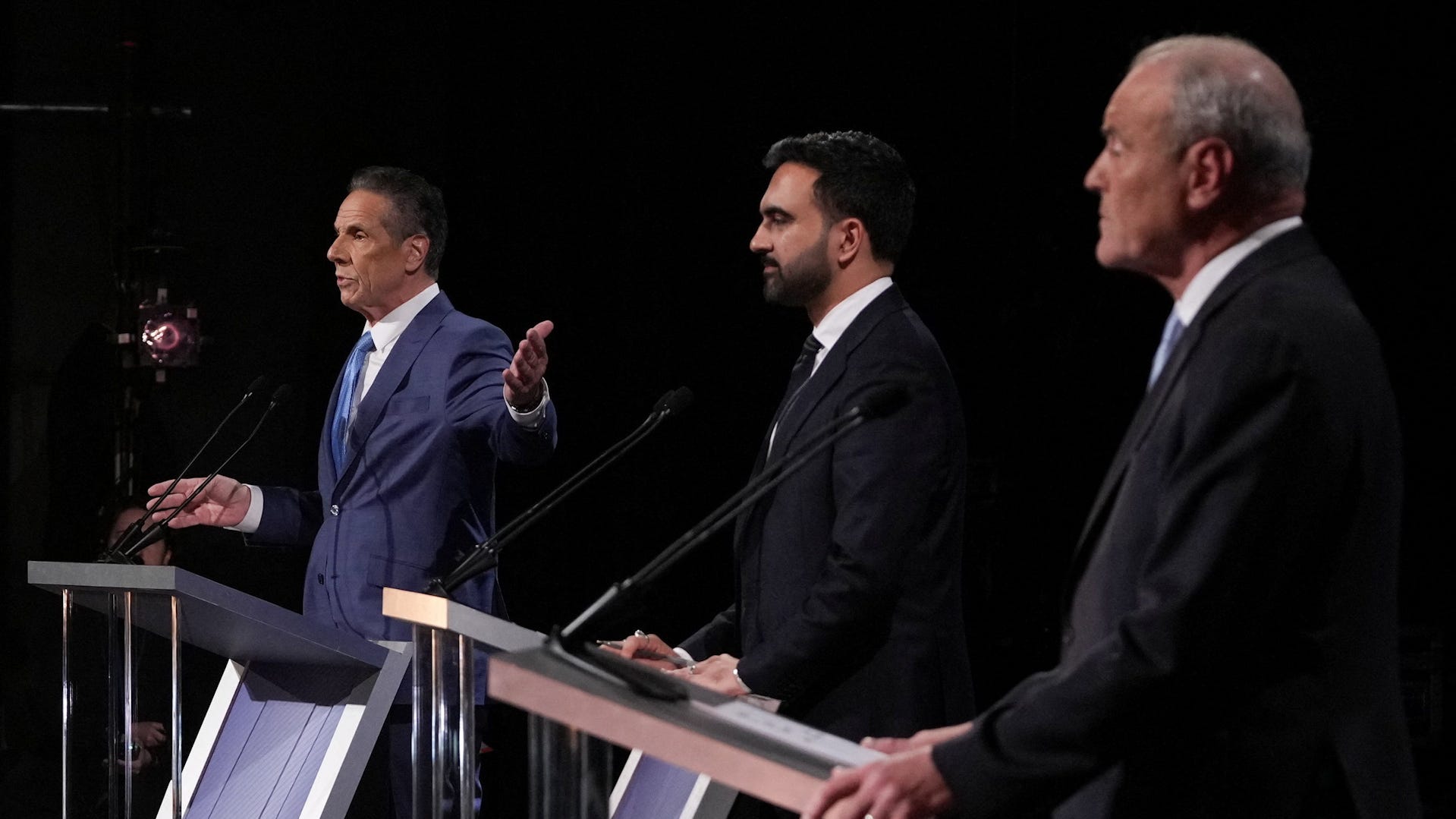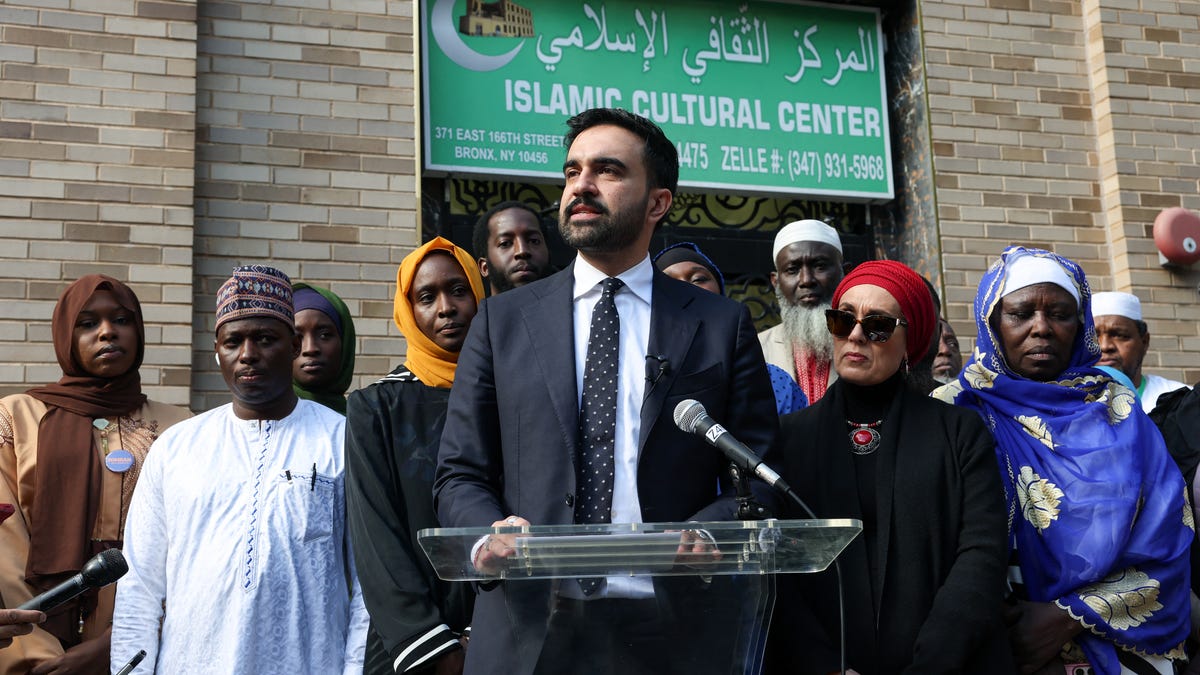The frontrunner is turning out Muslim and South Asian New Yorkers in historic numbers, while facing attacks on his faith and background.

Candidates for New York mayor face off in final debate
Andrew Cuomo, Zohran Mamdani, and Curtis Sliwa clashed over Trump, housing, crime, and sexual harassment claims.
NEW YORK − Zohran Mamdani, frontrunner for New York City mayor, stood in front of the Islamic Cultural Center, a brick mosque in the Bronx, on Oct. 24 and recalled a time when Muslim New Yorkers were told to practice their faith behind closed doors.
When Mamdani ran for Assembly six years earlier, an “uncle” gently told him he didn’t have to say he was Muslim. That time has passed, the Democratic nominee for New York City mayor declared.
“I will no longer look for myself in the shadows,” Mamdani said on a cool, sunny afternoon, surrounded by men and women set to attend Friday congregational prayer, or jummah. “I will find myself in the light.”
If elected Nov. 4, Mamdani, 34, would be the first Muslim and South Asian mayor of the nation’s largest city. He’s reshaped New York City’s electorate with Muslim and South Asian voters as part of a diverse coalition that’s projected to propel him to victory in less than two weeks.
And while his opponents have drawn on Islamophobic tropes in the closing days of the race to shrink his wide lead in the polls, Muslim New Yorkers told USA TODAY that his candidacy signals a historic point for a community often far from the city’s halls of power.
Regardless of who replaces current Mayor Eric Adams, he will represent the largest Muslim community in the United States.
‘Excitement of aunties and uncles’
Wasay Touray, 60, who works in a pizzeria, said politicians visited his Bronx mosque before, typically for tragedies such as a nearby apartment building fire in 2022 that killed many African immigrants. But his congregation, which is mostly African, had never had a Muslim politician pray with them, as Mamdani had.
“He’s going to try to open the door for other Muslims,” Touray said.
Mamdani brought historic numbers of Muslim, South Asian and Indo-Caribbean New Yorkers to vote in ways that didn’t register in traditional polling. The surge in engagement and participation, seen in viral social media moments but also on multilingual campaign outreach by relentless canvassing, allowed him to win in a stunning upset against former Gov. Andrew Cuomo in the Democratic primary in June.
“This has been coming,” Shahana Hanif, a city council member from Brooklyn and Mamdani ally, said. “Our political power has been growing.”
Hanif, the first Muslim woman and Bangladeshi American on the City Council, represents a district that also includes her native Kensington, where New York’s Little Bangladesh is located. That area, with a South Asian Muslim community, saw the largest increases in turnout in the 2025 primary compared to 2021. Hanif attributes it to the “excitement of aunties and uncles.”
Mamdani’s campaign outreach began exactly a year ago, right after he announced his candidacy, according to Jagpreet Singh, political director at DRUM Beats, an organization that engages South Asian and Indo-Caribbean New Yorkers. Singh previously worked with Mamdani at Chhaya Community Development Corporation, a Queens nonprofit, on tenant organizing while Mamdani was a foreclosure prevention counselor.
Before, Singh said, citywide politicians engaged South Asian and Muslim voters at Hindu Diwali or Islamic Eid celebrations, usually speaking to a few prominent gatekeepers, often religious leaders or business owners.
Mamdani started early, at temples, mosques and weekly street and cultural events, Singh said. By the time other candidates came around, leaders had to respond to community members already supporting Mamdani.
However, Mamdani didn’t just focus on his identity, as a Ugandan American with an ethnically Indian Muslim father and Hindu mother. Mamdani’s father, Mahmood Mamdani, a Columbia University professor, is from Uganda; his mother, the filmmaker Mira Nair, is from India. Mamdani was born in Uganda and raised in Manhattan’s Morningside Heights, near the Ivy League university where his father teaches.
Mamdani’s Instagram account recently posted a video of his campaign launch on Oct. 23, 2024. Signage then showed his signature three-part platform: rent freeze, free buses and universal child care. Singh said those policies didn’t just resonate with Mamdani’s educated, progressive base, but also immigrant New Yorkers struggling to pay for costs in the notoriously expensive city.
“He’s giving them inspiration and proving that you can still stake out bold progressive positions and get support,” Wa’el Alzayat, CEO of Emgage Action, a national Muslim American advocacy group, said. “You have to have the courage.”
Islamophobia remains prevalent
Mamdani has held positions critical of Israel and its treatment of Palestinians that were once thought to be taboo, especially in New York City, which has roughly 1 million Jews. However, his views aligned with many voters, including many Jewish New Yorkers, after Israel’s devastating two-year siege of Gaza following the Oct. 7 2023 Hamas-led attacks on southern Israel.
Nearly one in 10 of New York City’s 8.5 million residents are Muslim. Over 380,000 New Yorkers are South Asian, and more are Indo-Caribbean. Many of these communities were heavily surveilled and profiled after the 2001 terrorist attacks nearly a quarter-century ago.
Former Gov. Andrew Cuomo, an independent candidate, has centered on Mamdani’s faith − even citing sectarian differences within Islam − and seemingly agreed with a radio host that Mamdani would support another Sept. 11 terrorist attack. Republican Curtis Sliwa, trailing in third, falsely claimed Mamdani supported “global jihad.” Right-wing figures have fixated on how Mamdani eats rice with his fingers, which is how it’s traditionally eaten where his family originates in India.
Embattled Mayor Adams had dropped his long-shot re-election bid and endorsed Cuomo on Oct. 23, warning Mamdani’s election would bring “Islamic extremism.”
Amaney Jamal, dean of the Princeton University School of Public and International Affairs, said Mamdani’s political rise is breaking the ceiling for other Muslims in many ways. But he’s just one person, and his victory won’t radically erase Islamophobia in the country, let alone the city.
“We still have anti-Muslim hatred sometimes dominate many parts of formal political discourse in this country,” she said.
While first Muslim mayor is historic, ‘this is New York City’
In the Bronx, Amadou Barry, a 28-year-old pharmacy technician, waited to see Mamdani again after prayer. A registered independent, Barry couldn’t vote in the Democratic primary but planned to vote for Mamdani in the general election. While he appreciated the prospect of the first Muslim mayor, Barry was most concerned about affordability.
“Everybody wants someone they can relate to,” he said, but added, “this is New York City. There is so much diversity. That one thing cannot just be the reason why.”
As Mamdani remained inside the mosque, campaign canvassers registered people to vote as they went out onto the sun-filled Bronx street.
Eduardo Cuevas is based in New York City. Reach him by email at emcuevas1@usatoday.com or on Signal at emcuevas.01.
